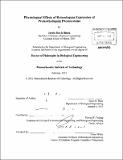Physiological effects of heterologous expression of proteorhodopsin photosystems
Author(s)
Buck, Justin David
DownloadFull printable version (15.65Mb)
Other Contributors
Massachusetts Institute of Technology. Dept. of Biological Engineering.
Advisor
Edward F. De long.
Terms of use
Metadata
Show full item recordAbstract
Proteorhodopsin (PR) phototrophy plays an important role in the marine ecosystem, harvesting energy from sunlight for a diverse community of hetertrophic organisms. The simple proteorhodopsin photosystem (PRPS) composed of six to seven genes is sufficient for producing a functional light-driven proton pump, capable of powering cellular processes. This thesis describes the functional characterization of a subcloned PRPS previously identified from a large insert metagenomic library (Martinez et al., 2007). Incorporation of the PRPS into a strain of Pseudomonas putida resulted in a light-dependent increase in viable cell yield of cultures grown in low carbon media. The light-dependent effect demonstrates a dependence on carbon, reducing at increasing carbon concentrations until no differential effect is observed. A survey of six PR-containing vectors from metagenomic libraries revealed PR transcription in two hosts, P. putida and Pseudoalteromonas atlantica, and of the three additional vectors with PRPS tested, two demonstrated the same qualitative light-dependent yield increase. This work illustrates the utility of a simple rhodopsin photosystem for supplementing the cellular energy system of a heterologous host, paving the way for future engineering applications in photoheterotrophy.
Description
Thesis (Ph. D.)--Massachusetts Institute of Technology, Dept. of Biological Engineering, 2012. Cataloged from PDF version of thesis. Includes bibliographical references (p. 175-195).
Date issued
2012Department
Massachusetts Institute of Technology. Department of Biological EngineeringPublisher
Massachusetts Institute of Technology
Keywords
Biological Engineering.